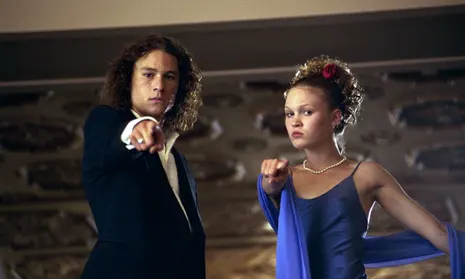Heath Ledger and Julia Stiles as Patrick and Kat 10 Things I Hate About You (1999)
With most modern romantic comedies failing to impress, viewers are looking back to retro romcoms for love and laughs.
The 1990s and early 2000s were jam-packed with romantic comedies that have remained classics for decades.
From star-studded titles like “She’s the Man” to timeless flicks like “She’s All That,” the romcoms we grew up with seem to be in a completely different league from today’s contributions.
What made these older movies so magical in the first place? Romcom fans point to many possible explanations, but I’ve compiled a list of the top five reasons why new romcoms seem to fall flat.
- Characters
When it comes to any story, the main character should be likable. For romcoms, it’s doubly important for the audience to root for the protagonist.
Main characters nowadays tend to feel very one-dimensional. From the insufferable title character of Netflix’s “Sierra Burgess Is A Loser” to anyone in “The Kissing Booth,” most viewers end up falling asleep rather than at the edge of their seats.
Older romcoms maintained distinct personalities and realistic friendships for their female leads that made audiences hope for a happy ending. Even during the era where every main character seemed to be a young woman pursuing journalism, they felt like individuals.
Andie Anderson and Jenna Rink may have both found their bliss after leaving a fashion magazine, but “How to Lose a Guy in 10 Days” and “13 Going on 30” are still wildly different movies with unique characters and storylines.
- Originality
That idea of uniqueness seems to be lacking in general nowadays. Romcoms don’t feel like stories anymore– they feel like clichés glued together.
There’s the meet-cute. They bump into each other in an elevator or spill coffee or drop books. The stars always perfectly align for them to meet.
There’s the complication between the two love interests that falls into a generic trope. Are they enemies-to-lovers? Coworkers-to-lovers? What about childhood-best-friends-to-lovers?
There’s the last-second conflict that strikes right before they ride off into the sunset. It pops up and is solved just as quickly, but it offers one last hoop to jump through to prove that they really love each other.
Older romcoms don’t feel as formulaic because they didn’t have successful blueprints to be compared to. They were the blueprint! There was nothing generic about two people anonymously emailing each other (“You’ve Got Mail”) or an FBI agent going undercover at a beauty pageant (“Miss Congeniality”).
Many films included the same moments criticized above, but they never felt forced or intentionally basic.
Without anything to distinguish themselves from the herd, modern romcoms only end up predictable rather than praiseworthy.
- Chemistry
One of the most common critiques I’ve seen given to modern romantic comedies is the lack of chemistry between the main characters.
Sydney Sweeney and Glen Powell became a meme during their press tour for “Anyone but You” due to their perceived lack of connection.
Similarly, Reese Witherspoon and Ashton Kutcher seemed to lack any sort of tension during their Netflix romcom “Your Place or Mine.” People seemed more entertained by the red carpet photos where the two actors posed with palpable distance between each other than they did for the film itself.
Chemistry was a critical concern for older romcoms. Hugh Grant was the male lead for dozens of movies simply because he could make the audience think he loved every woman he worked with. As a duo, Meg Ryan and Tom Hanks co-starred in three different romcoms because of how well they worked together.
Today, even if you put two incredibly talented actors together, there’s no guarantee that they’ll mesh. Without the necessary chemistry, the central love story will lack any believability.
- Thematic Elements
A good romcom focuses on both halves of its name: romance and comedy. The best romcoms of all time lean into the humor just as much as they lean into the heart.
Rather than trying to address all the world’s evils or walk the line of a tearjerker, true romcoms care more about uplifting their characters than putting them through trauma just for an interesting backstory.
Even the better romcoms of today still attempt to include some kind of social commentary or profound truth to their story, and they suffer because of it.
Movies like “The Wedding Singer” are popular because of pure stupid fun. There are moments of drama, but it’s never serious or disheartening.
The romcom is a genre built on the escapism it can offer a viewer. We want to laugh and cry because the main characters are falling in love, not because the main character is an orphan or terminally ill.
- Nostalgia
Nostalgia is a powerful drug. It can make you romanticize anything and turn every memory into “the good old days.”
While I maintain that most old romcoms are better than modern attempts, there is something to be said about letting it simmer.
Some of the most popular romcoms of the 90s don’t age perfectly well looking back. Some modern romcoms aren’t as bad as they seem. It’s all relative, and everyone has their own preferences.
All I want to see from filmmakers in the future are romcoms that feel genuine. Don’t sacrifice the story for a quick swoon.
With enough care, modern romcoms can capture the 90s magic… even if they can’t match the killer soundtracks.

